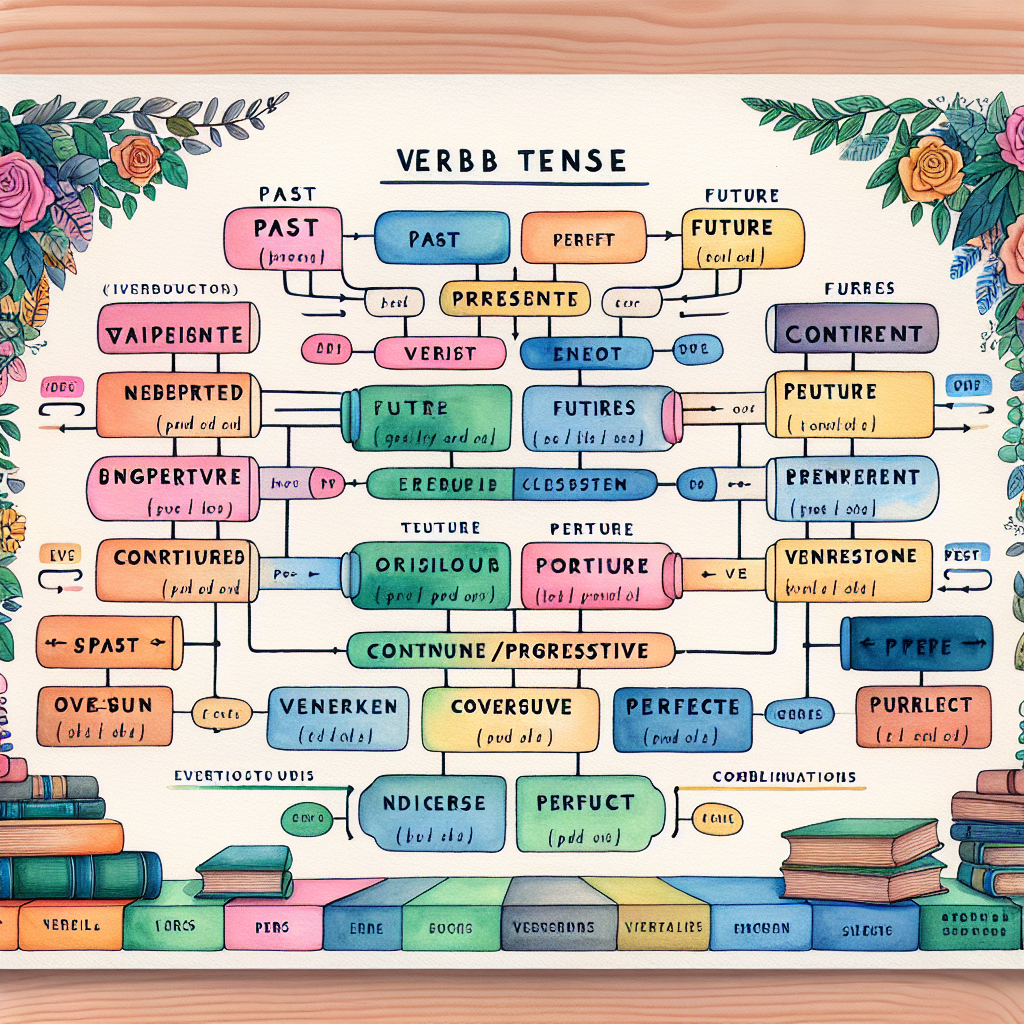Conjugation of Verbs in Each Tense

प्रत्येक काल में क्रियाओं के रूप
अंग्रेजी भाषा में समय (Tenses) के अनुसार क्रिया (Verb) के रूप बदलते हैं। मुख्यतः तीन प्रकार के काल (Tenses) होते हैं: वर्तमान (Present), अतीत (Past), और भविष्य (Future)। प्रत्येक काल में चार उप-प्रकार होते हैं: साधारण (Simple), निरंतर (Continuous), पूर्ण (Perfect), और पूर्ण निरंतर (Perfect Continuous)।
यहाँ उपरोक्त सभी 12 कालों में क्रियाओं के रूप (Conjugation) का वर्णन है:
1. वर्तमान काल (Present Tense)
1.1 साधारण वर्तमान (Simple Present)
- Structure: Subject + Base form of Verb + (s/es for third person singular)
- Example:
- I/We/You/They play.
- He/She/It plays.
1.2 वर्तमान निरंतर (Present Continuous)
- Structure: Subject + am/is/are + Verb-ing
- Example:
- I am playing.
- He/She/It is playing.
- We/You/They are playing.
1.3 वर्तमान पूर्ण (Present Perfect)
- Structure: Subject + has/have + Past Participle
- Example:
- I/We/You/They have played.
- He/She/It has played.
1.4 वर्तमान पूर्ण निरंतर (Present Perfect Continuous)
- Structure: Subject + has/have + been + Verb-ing
- Example:
- I/We/You/They have been playing.
- He/She/It has been playing.
2. अतीत काल (Past Tense)
2.1 साधारण अतीत (Simple Past)
- Structure: Subject + Verb in Past form
- Example:
- I/We/You/They/He/She/It played.
2.2 अतीत निरंतर (Past Continuous)
- Structure: Subject + was/were + Verb-ing
- Example:
- I/He/She/It was playing.
- We/You/They were playing.
2.3 अतीत पूर्ण (Past Perfect)
- Structure: Subject + had + Past Participle
- Example:
- I/We/You/They/He/She/It had played.
2.4 अतीत पूर्ण निरंतर (Past Perfect Continuous)
- Structure: Subject + had + been + Verb-ing
- Example:
- I/We/You/They/He/She/It had been playing.
3. भविष्य काल (Future Tense)
3.1 साधारण भविष्य (Simple Future)
- Structure: Subject + will/shall + Base form of Verb
- Example:
- I/We/You/They/He/She/It will play.
- I/We shall play.
3.2 भविष्य निरंतर (Future Continuous)
- Structure: Subject + will/shall + be + Verb-ing
- Example:
- I/We/You/They/He/She/It will be playing.
- I/We shall be playing.
3.3 भविष्य पूर्ण (Future Perfect)
- Structure: Subject + will/shall + have + Past Participle
- Example:
- I/We/You/They/He/She/It will have played.
- I/We shall have played.
3.4 भविष्य पूर्ण निरंतर (Future Perfect Continuous)
- Structure: Subject + will/shall + have been + Verb-ing
- Example:
- I/We/You/They/He/She/It will have been playing.
- I/We shall have been playing.
सारांश (Summary):
क्रियाओं के रूप (Verb Conjugations) को हर समय (Tense) में सही ढंग से बदलना महत्वपूर्ण है ताकि वाक्य का सही अर्थ व्यक्त हो सके। ऊपर दिए गए उदाहरणों में विभिन्न समय और उप-समय के क्रिया रूपों का वर्णन किया गया है।
इन्हें निम्नलिखित सारणी में संक्षेप में दिखाया गया है:
| Tense | Structure | Example |
| साधारण वर्तमान काल (Simple Present) | Subject + Base form of Verb + s/es | I play, He plays |
| वर्तमान निरंतर काल (Present Continuous) | Subject + am/is/are + Verb-ing | I am playing, He is playing, They are playing |
| वर्तमान पूर्ण काल (Present Perfect) | Subject + has/have + Past Participle | I have played, He has played |
| वर्तमान पूर्ण निरंतर काल (Present Perfect Continuous) | Subject + has/have + been + Verb-ing | I have been playing, He has been playing |
| साधारण अतीत काल (Simple Past) | Subject + Verb in Past form | I played, He played |
| अतीत निरंतर काल (Past Continuous) | Subject + was/were + Verb-ing | I was playing, They were playing |
| अतीत पूर्ण काल (Past Perfect) | Subject + had + Past Participle | I had played, He had played |
| अतीत पूर्ण निरंतर काल (Past Perfect Continuous) | Subject + had + been + Verb-ing | I had been playing, They had been playing |
| साधारण भविष्य काल (Simple Future) | Subject + will/shall + Base form of Verb | I will play, We shall play |
| भविष्य निरंतर काल (Future Continuous) | Subject + will/shall + be + Verb-ing | I will be playing, We shall be playing |
| भविष्य पूर्ण काल (Future Perfect) | Subject + will/shall + have + Past Participle | I will have played, We shall have played |
| भविष्य पूर्ण निरंतर काल (Future Perfect Continuous) | Subject + will/shall + have been + Verb-ing | I will have been playing, We shall have been playing |
इन संरचनाओं और उदाहरणों का प्रयोग करके आप विभिन्न समय और काल में क्रियाओं का सही रूप जान सकते हैं और उनका सही उपयोग कर सकते हैं। Regular अभ्यास आपको इन रूपों में निपुणता प्राप्त करने में मदद करेगा।

